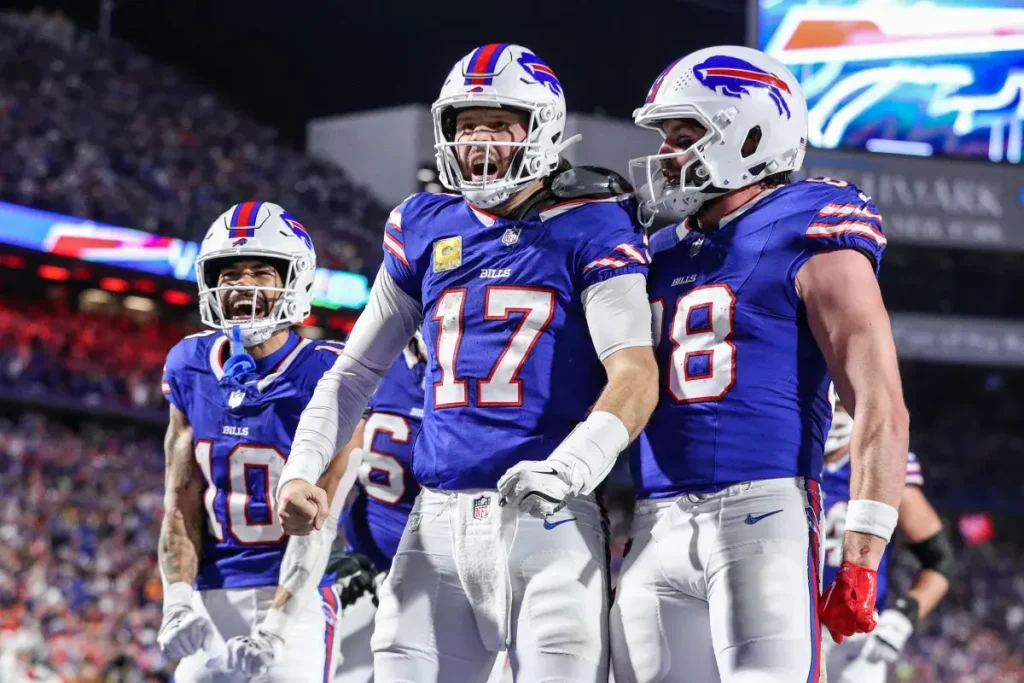Bills May Look to Trade Pro Bowl Tight End Dawson Knox Before Deadline
As the NFL trade deadline looms, teams across the league are evaluating their rosters to either strengthen for a playoff push or shed salary for future flexibility. The Buffalo Bills, despite their recent two-game skid, stand at a solid 4-2 and remain strong contenders in the AFC playoff picture. However, they find themselves with an interesting dilemma: an abundance of talent at the tight end position that could make one veteran player expendable in the coming weeks.
The Bills’ tight end room currently features former Pro Bowler Dawson Knox, promising youngster Dalton Kincaid, and rookie Jackson Hawes. With Kincaid developing into a key offensive weapon before his recent injury and Hawes showing potential as a developmental prospect (despite his own injury concerns), Knox appears to be the odd man out in Buffalo’s future plans. The veteran tight end’s production has noticeably declined this season, managing just seven receptions for 73 yards and one touchdown through six games. This limited usage, coupled with financial considerations, makes Knox a prime trade candidate as teams look to bolster their rosters before the deadline.
Financial considerations play a significant role in this potential move. As Randy Gurzi of Bills on SI points out, Knox carries the second-highest cap hit on the team this season behind only quarterback Josh Allen. More importantly, trading Knox would free up more than $12 million in cap space for the 2026 season—valuable flexibility for a team that will need to navigate several key contracts in the coming years. While moving a veteran player during a playoff push might seem counterintuitive, the emergence of Hawes as a potential TE2 behind Kincaid could make Knox’s substantial salary difficult to justify for a third tight end option.
Knox isn’t far removed from his peak performance in Buffalo. Just two seasons ago in 2022, he earned Pro Bowl honors after recording 517 yards and five touchdowns as a reliable target for Allen. However, his production has steadily declined since then, and the Bills appear ready to commit to a youth movement at the position with Kincaid leading the way. Kincaid’s current injury complicates the timing of any potential trade, but once he returns to his normal role, the path toward moving Knox becomes clearer. The Bills’ willingness to trade the veteran will ultimately depend on their confidence in Hawes’ ability to step up as the clear backup and potentially Keleki Latu’s readiness to fill the TE3 role.
If Buffalo does decide to move on from Knox, they could reasonably expect to receive a mid-round draft pick—likely in the fourth or fifth round range—from a tight end-needy team. Several contenders around the league would likely jump at the opportunity to add a proven, athletic tight end with red zone prowess to their offensive arsenal. For teams with playoff aspirations but lacking production at tight end, Knox represents a potentially valuable addition who has demonstrated the ability to contribute at a high level in the right system.
The potential trade of Dawson Knox exemplifies the constant balancing act NFL teams must perform between immediate competitive needs and long-term roster management. The Bills appear positioned to remain competitive while simultaneously preparing for future seasons by accumulating draft capital and creating financial flexibility. While Knox has been a valuable contributor during his time in Buffalo, the emergence of younger, less expensive options makes him a logical trade candidate as the deadline approaches. How the Bills handle this situation will provide insight into their priorities moving forward—whether they value depth at all costs for a Super Bowl push or prefer to maximize assets for sustained success beyond this season.


